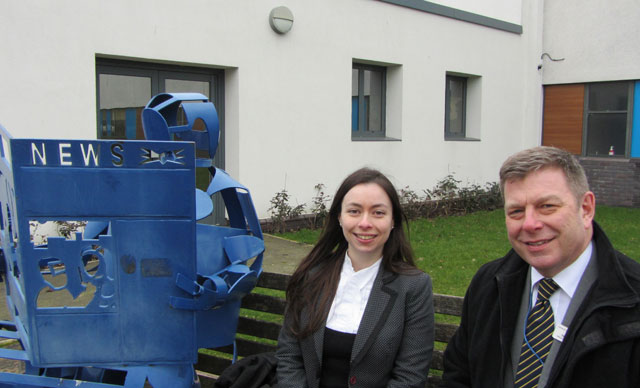
Dr Majella Munro with the Trust's Special Projects Director Nick Chatten, sitting alongside one of the group of Tubular Figures by Michael Condon, affectionately known as ‘The Blue Men’.
Making sure patients, staff and visitors get the full benefit of the art on display at Colchester hospitals is the aim of a new research project being backed by the national Arts and Humanities Research Council (AHRC).
Dr Majella Munro, who completed her PhD in Art History at the University of Essex in 2011, is the lead researcher on the project to catalogue the art collection of Colchester Hospital University NHS Foundation Trust (CHUFT).
The first phase, which runs from now until the end of April 2013, is funded by the AHRC under its new Cultural Engagement Fund initiative.
The Trust has a sizeable art collection, located across its sites, including large sculptures, oil paintings, ceramic mosaics and photographic prints.
The project aims to strengthen the standards of stewardship of the collection and to improve the quality of the environment for patients, visitors and staff by enhancing engagement with the visual arts.
Consultant in Anaesthesia and Intensive Care, Dr Simon Dixon, who is also a member of the Trust’s Visual Arts Committee, emphasised that a huge amount of research had shown the value and benefits of art in hospitals.
He said: “Emotions are often highly charged in hospitals, for patients, visitors and staff alike. Art, by distracting or challenging us, can enable us to temper those emotions. It can help us step back a little and by giving time to reflect, enable a fresher, clearer perspective to emerge.
“Being in the right state of mind is so important to the effectiveness of the treatment we are receiving or the work we carry out.”
The first phase of work includes research on the collection, conservation assessment and digital cataloguing. As the project develops other Essex Art History graduates and students will have the opportunity to contribute and assist in the development of texts about the collection.
Dr Munro said: “The contribution of works of art to both patient experience and clinical practice is recognised throughout Colchester Hospital Trust. This project creates opportunities for the hospital to benefit from the art history expertise at Essex, so that these works can be appropriately installed, labelled and documented, not only for the purpose of sparking conversations between staff, visitors and patients about the collection, but also to preserve it for the Trust's future.
“Applying research skills beyond the university environment is also critical to diversifying the skill sets of current research students.”
The AHRC’s Cultural Engagement Fund offered funding to help academics working in the arts and humanities to engage with businesses, civic and cultural organisations and the public sector.
The projects not only support valuable collaboration between universities and other organisations, but also provide early career researchers with opportunities to develop a wide range of skills, particularly in relation to supporting the wider impact of arts and humanities research.
Dr Ian Lyne, Associate Director of Programmes at the AHRC, said: “The range of projects and the variety of local partners involved has been terrific.”
Notes to Editors
Photo available.
For further information please contact:
University of Essex Communications Office: Communications Officer, Ben Hall,– e-mail: bhall@essex.ac.uk, tel.: 01206 874377.
Colchester Hospital University NHS Foundation Trust: Head of External Relations, Mark Prentice - e-mail: mark.prentice@colchesterhospital.nhs.uk, tel: 01206 742752.
Arts and Humanities Research Council: Communications Manager, Danielle Moore-Chick - e-mail: D.Moore-Chick@ahrc.ac.uk, tel: 01793 416021.
The AHRC Cultural Engagement Fund:
1. AHRC Cultural Engagement funding is awarded to contribute to the costs of individuals working on short three-month Cultural Engagement projects. Funding could be used either to cover the full economic costs of employing a single individual for three months, or used in combination with other funding to support individuals on two or more projects. These short-term project posts could be full-time or part-time, and were aimed at recently completed PhD students in the arts and humanities (including students who have recently submitted their theses, and are awaiting examination).
2. The AHRC funds world-class, independent researchers in a wide range of subjects: ancient history, modern dance, archaeology, digital content, philosophy, English literature, design, the creative and performing arts, and much more. This financial year the AHRC will spend approximately £98m to fund research and postgraduate training in collaboration with a number of partners. The quality and range of research supported by this investment of public funds not only provides social and cultural benefits but also contributes to the economic success of the UK.